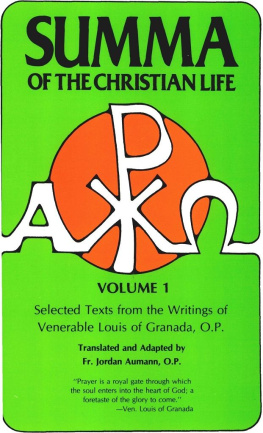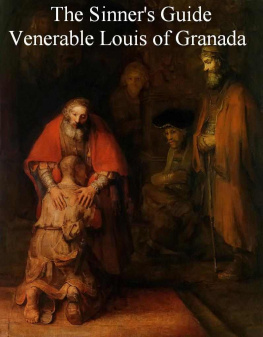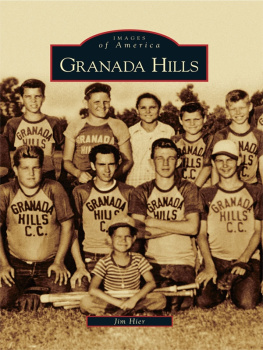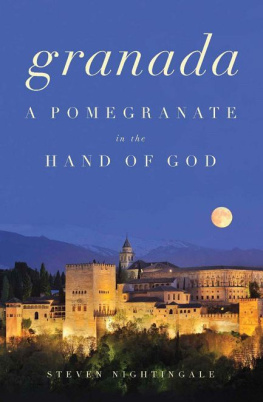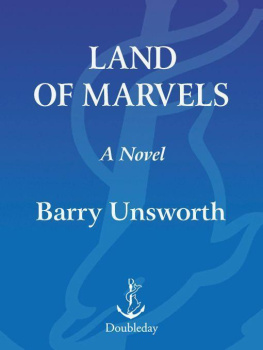Louis of Granada - The Marvels of Creation
Here you can read online Louis of Granada - The Marvels of Creation full text of the book (entire story) in english for free. Download pdf and epub, get meaning, cover and reviews about this ebook. year: 2019, publisher: TAN Books, genre: Science. Description of the work, (preface) as well as reviews are available. Best literature library LitArk.com created for fans of good reading and offers a wide selection of genres:
Romance novel
Science fiction
Adventure
Detective
Science
History
Home and family
Prose
Art
Politics
Computer
Non-fiction
Religion
Business
Children
Humor
Choose a favorite category and find really read worthwhile books. Enjoy immersion in the world of imagination, feel the emotions of the characters or learn something new for yourself, make an fascinating discovery.

- Book:The Marvels of Creation
- Author:
- Publisher:TAN Books
- Genre:
- Year:2019
- Rating:3 / 5
- Favourites:Add to favourites
- Your mark:
- 60
- 1
- 2
- 3
- 4
- 5
The Marvels of Creation: summary, description and annotation
We offer to read an annotation, description, summary or preface (depends on what the author of the book "The Marvels of Creation" wrote himself). If you haven't found the necessary information about the book — write in the comments, we will try to find it.
The Marvels of Creation — read online for free the complete book (whole text) full work
Below is the text of the book, divided by pages. System saving the place of the last page read, allows you to conveniently read the book "The Marvels of Creation" online for free, without having to search again every time where you left off. Put a bookmark, and you can go to the page where you finished reading at any time.
Font size:
Interval:
Bookmark:
The Marvels of Creation 2019 TAN Books
All rights reserved. With the exception of short excerpts used in critical review, no part of this work may be reproduced, transmitted, or stored in any form whatsoever, without the prior written permission of the publisher.
This work has been taken, edited, and arranged from the TAN Edition of Summa of the Christian Life, which is in the public domain. All editing arrangement TAN books. All Rights reserved.
Unless otherwise noted, the editors use of the Douay-Rheims Version for biblical quotations has been retained. Typography and changes in this edition are the property of TAN Books and may not be reproduced, in whole or in part, without written permission of the publisher.
Cover & interior design by www.davidferrisdesign.com
Image Credits
Cover
Third Day of Creation, Genesis, Schnorr von Carolsfeld, Julius (1794-1872) / Lebrecht Authors / Bridgeman Images
AngryBrush, Morphart Creation, Danussa, Christos Georghiou, Hein Nouwens, oleskalashnik, Channarong Pherngjanda, sar14ev, Manekina Serafima, Golden Shrimp Shutterstock.com
Interior images
: Traditional Line Art, St. Edmund Campion Missal & Hymnal for the Traditional Latin Mass Corpus Christi Watershed
: Third Day of Creation, Genesis, Schnorr von Carolsfeld, Julius (1794-1872) / Lebrecht Authors / Bridgeman Images
ISBN: 9781505114812
Library of Congress Control Number: 2019950690
Published in the United States by
TAN Books
PO Box 410487
Charlotte, NC 28241
www.TANBooks.com
Printed in the United States of America 2019
Ven. Luis of Granada, OP
Edited and arranged by
Ryan Grant
TAN Books
Charlotte, North Carolina
T he Venerable Louis of Granada was a 16th century Spanish Dominican. He is celebrated as a theologian of great merit, and the author of numerous spiritual works, such as the Sinners Guide.
In this holy Dominicans meditation on creation, you will find no polemical work of any sort. In our day debates about creation and questions raised by modern science cause a great deal of contention and consternation. However, in the Marvels of Creation, these debates are far from the mind of the author. This is not merely because the work was written four centuries ago, but even more so, because his aim is one specific thing: that man might see the wonders that God has put in plain sight and give glory to Him for them. Thus, the reader can take the book in confidence and find herein great spiritual fruit, whatever his views are in relation to modern questions on creation.
Nevertheless, though the author writes as a theologian and only means to present the science as it was in his own day, just the same, discoveries subsequent to his time have allowed for the formulation of new principles and led to the rejection of older ideas in favor of more precise modern formulations. So, when the author makes reference to Aristotles notion of the four elements, or Galens teaching of the humors, these theories of ancient learning are best looked upon as superseded rather than merely wrong. The theory of the humors, for what it was meant to explain, is not wrong per se, but it is too broad to be precise, let alone isolate phenomena or predict events based on principles. Likewise, the theory of the four elements, which is not wrong in observing that some things go down and others tend to go up, is still wrong as to the causes of such things. In both areas, modern science affords us more precise theories that more accurately describe what takes place and allow us to predict other events based on them. Whenever it is advantageous to the reader, we have placed footnotes where a claim or comparison by the author has been superseded or corrected by modern scientific knowledge.
None of this should trouble the reader when he comes across an antiquated description of events. In fact, noting our more precise scientific theories in physics or cosmology, we should give God glory all the more for the complicated workings of the created world that we find all around us, and of which we are, nevertheless, the pinnacle.
Therefore, let the reader carefully and prayerfully consider the wisdom of Fr. Granada, and look with wonder at all things, great and small, which our creator God has placed in the world for us.
The Editor
I n the following work, our aim is none other than that man should glorify Almighty God by seeing His providence and care at work in creation. We shall look at the works of the creator that are both great and small, complex and simple, to see His handiwork not only in the marvelous arrangement of stars and planets, but of tiny ants and bees which we overlook on account of their size.
To do this, I shall quote from many authors who observed these marvels while adding commentary to them so as to fix the mind of the reader inextricably on God. There is nothing in this work that will not seem positively wondrous and which will not give further testimony of the wisdom and providence of God who made all these things.
The interpretation and application of these marvels I leave to the devotion and prudence of the reader. If I were to comment on each detail, the discussion would be too lengthy. I should like only to remind the reader that man is created in the image and likeness of God because of his immortal soul, which is illumined with the light of reason. As a result, man is not only able to know divine things, but also to establish and govern nations, with all their necessary offices and functions. But the reader should realize that while man does all these things through the light of reason with which he has been endowed, Gods smallest creatures perform many of the same functions much better than does man himself, although they lack the use of reason. Moreover, while man can indeed devise many marvels, whether they be great buildings or great works of the mind, the great creations of God that light the heavens, and the mighty animals of the earth eclipse his endeavors.
This applies to many of the things we shall now describe, and we should remember that God did all this to manifest His greatness and providence, so that knowing these things, we would honor and reverence Him.
The Ven. Louis of Granada
S acred scripture tells us of the immensity and greatness of our Creator. This fact of revelation may also be understood by making a simple exploration into the world He created, since it gives clear testimony to Gods greatness.
One of the many differences between the Creator and His creatures is that all created things have limits and boundaries to which their natures and powers extend. As a result, they have a limited or finite being and limited powers, knowledge, and faculties that flow from that being. This limitation is according to the measure that the Creator willed to impart to His creatures, giving more to some and less to others.
Seeing that God Himself was not created by any superior being, there is no being that can put limits or boundaries to His essence, power, knowledge, goodness, happiness, or any of His other perfections and attributes. Now, since there are no limits or restrictions of any kind in God, He is infinite in every respect. Therefore, His being is infinite, as are all of His other attributes, such as His beauty, His glory, His richness, His mercy, and His justice. Because He is incomprehensible and ineffable, no creature that has been made or could be made will ever comprehend Him. God alone can perfectly know and comprehend Himself.
Font size:
Interval:
Bookmark:
Similar books «The Marvels of Creation»
Look at similar books to The Marvels of Creation. We have selected literature similar in name and meaning in the hope of providing readers with more options to find new, interesting, not yet read works.
Discussion, reviews of the book The Marvels of Creation and just readers' own opinions. Leave your comments, write what you think about the work, its meaning or the main characters. Specify what exactly you liked and what you didn't like, and why you think so.


